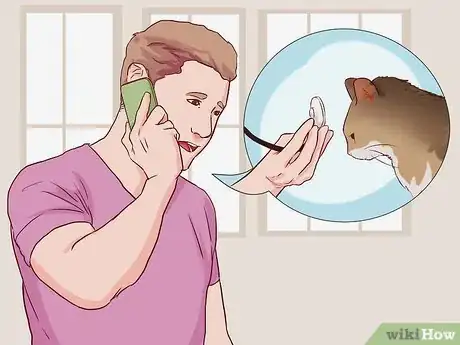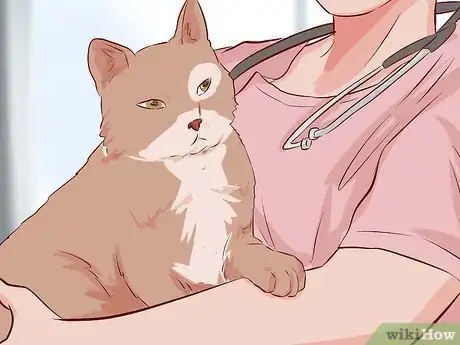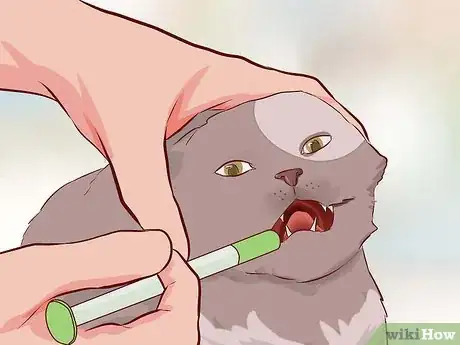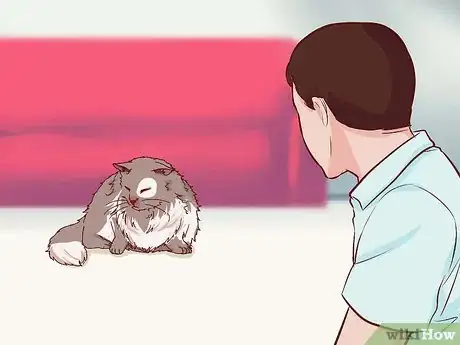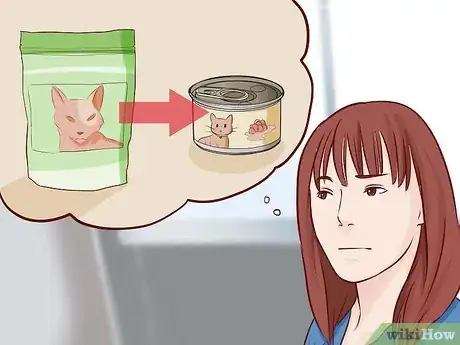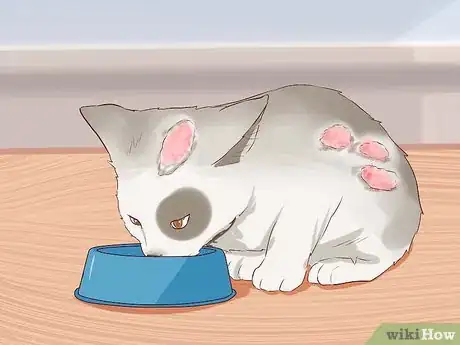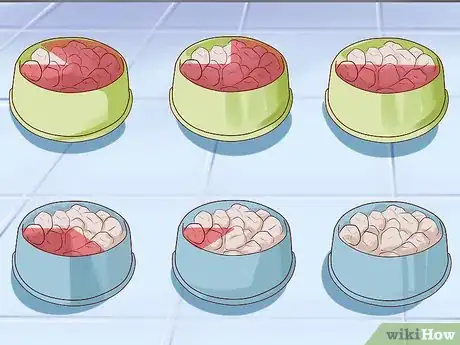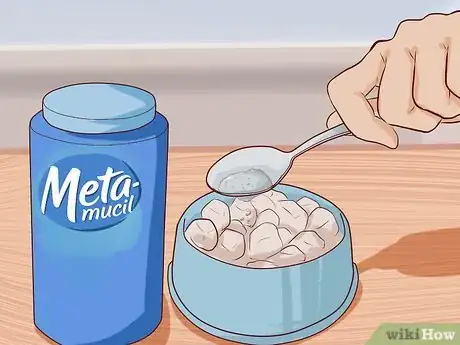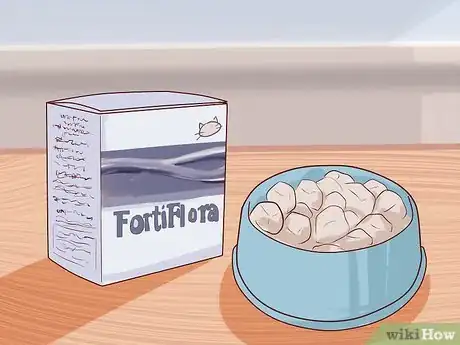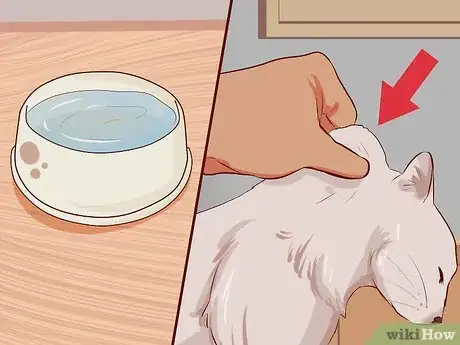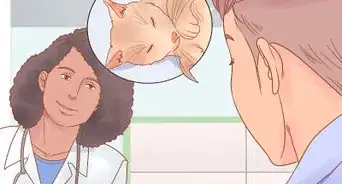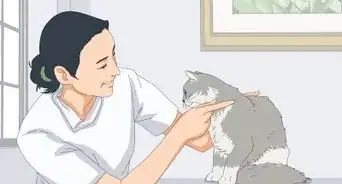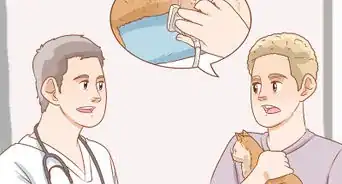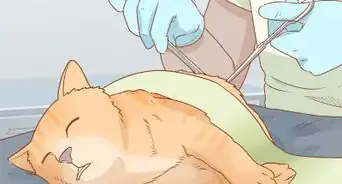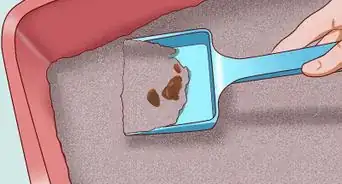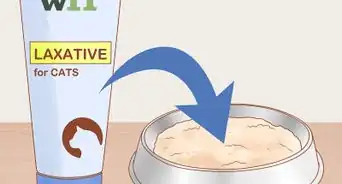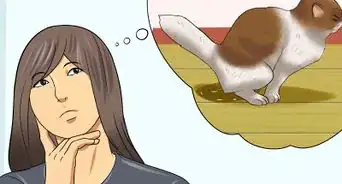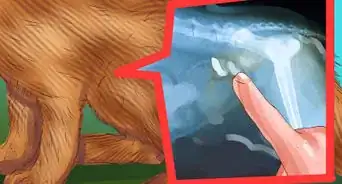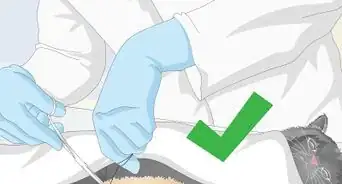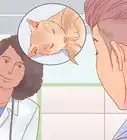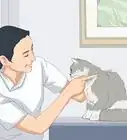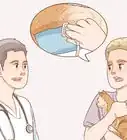This article was co-authored by Natalie Punt, DVM. Dr. Natalie Punt is a Veterinarian and the Founder and CEO of mPet- a smart phone app for pet owners to store, manage and transfer their pets medical records and health information. She specializes in small animal emergency and general medicine and veterinary practice economics. Dr. Punt holds a BS in Biochemistry and Molecular Biology from The University of California, Davis, an MS in Biochemistry from The University at Buffalo, and a DVM from Western University of Health Sciences.
wikiHow marks an article as reader-approved once it receives enough positive feedback. This article received 19 testimonials and 100% of readers who voted found it helpful, earning it our reader-approved status.
This article has been viewed 1,396,816 times.
All cats have digestive troubles from time to time, and diarrhea is not uncommon. Usually, diarrhea lasts a day or so and clears up on its own. Other times, it may last for several days and cause dehydration, weight loss and lethargy. When your cat shows these signs, you'll most likely need to treat her with medication and reconsider her diet.
Steps
Treating Your Cat's Diarrhea With Medication
-
1Know when to go to the veterinarian. If your cat has diarrhea that lasts more than a few days, if she's also vomiting, or if she also seems lethargic (more tired than usual) she needs veterinary attention. Call your vet and ask if you should bring a sample of the feces with you in case your veterinarian wants to do an analysis of the specimen.
-
2Take your cat to the veterinarian. Bring a fresh fecal sample that's less than 12 hours old. Small amounts of red blood in the stool may be a minor issue. If the stool appears black and sticky (or “tarry”), it may mean that digested blood is coming from the stomach and that a stomach ulcer may have formed. Your veterinarian will probably do some tests (blood work, fecal analysis for internal parasites, x-rays, ultrasound) and prescribe a medication.
- If your veterinarian finds intestinal parasites in your cat’s stool, the appropriate medication will be prescribed. If it's not an intestinal parasite, the veterinarian may prescribe a medication to slow down the diarrhea, such as Metronidazole, Prednisolone or Tylosin.
Advertisement -
3Give your cat the prescribed medication. Bring your cat into a small room and shut the door. Hold your cat firmly in your left arm (if you're right-handed) and wrap her in a towel like a cocoon if she will let you. Give the medicine using a syringe (or eyedropper) at the side of the cat’s mouth and administer a little at a time.
- Make sure the cat is swallowing the medicine and not just letting it drip out. Your veterinarian should include a syringe or eyedropper when they dispense liquid medications. It never hurts to ask for a second one just in case you need a back up.
- You may want to give your cat a second syringe with a small amount of room temperature water to swallow: this will help clear the medicine taste from his mouth.
-
4Observe whether the cat improves. Be sure to ask your vet how soon you should see improvement. Some chronic conditions, like inflammatory bowel disease, may need medication for months, perhaps for life.[1] [2] If the treatment plan is working for your cat, the diarrhea should improve or be resolved completely.
- Signs of Inflammatory bowel disease (IBD) are: weight loss, dehydration, vomiting, and diarrhea. Your veterinarian will need to run tests to determine if your cat has IBD, chronic diarrhea related to intestinal cancer, or regular diarrhea.
Changing Your Cat's Diet
-
1Consider any changes to the cat's food. If the diarrhea happened within a day or so of changing cat foods or introducing a new food, it could be the new diet. Go back to the old food that was not causing problems and the stool may go back to normal. When the stool is firmed up, try changing the diet very gradually, a little new food at a time.
-
2Consider if your cat has food allergies. If you suspect your cat is allergic to her food, try changing her diet. Food sensitivities (allergies) do occur in cats and may cause diarrhea. So, when changing the diet, make sure the new food has very different ingredients than the old food, otherwise, there may not be much difference to the cat at all.
- Your veterinarian can also discuss with you trying a high fiber diet for your cat. This may include the use of a prescription diet available only through veterinary channels, and not found on the pet store shelves. Royal Canin, Hill’s Prescription Diets and Purina pet food companies have a veterinary-only subset of diets created for special medical conditions.
-
3Gradually introduce a new diet. For some pets, you might slowly introduce a new food. A good ratio might be 90 percent current food and 10 percent new food. Gradually increase the amount until you reach all new food in about 10 days. Let your kitty tell you how fast you can switch to the new diet.
- Other cats may prefer adding 10% new food and remaining at that ratio for 3-5 days before adding in 10% more. There is no hard and fast rule and it is not a race.
-
4Use Metamucil. Adding half a teaspoon of unflavored Metamucil into your cat's food once or twice a day for 5-7 days may help firm things up. Canned plain pumpkin may do the same thing. Both Metamucil and canned pumpkin are high in fiber.
-
5Add probiotics to your cat’s diet. Probiotics add good intestinal “bugs” back into the gastrointestinal system to help rebalance a system that is out of sorts with the diarrhea.[7] An easy and tasty option is FortiFlora for cats, an over the counter (OTC) Purina product.
-
6Offer plenty of water. Water loss can be significant with ongoing diarrhea and your pet can get dehydrated. To detect dehydration, gently pinch the normally loose skin at the back of the neck. When a cat is normally hydrated, the skin snaps right back down. If the pinched skin smooths out slowly, or remains tented, the cat is dehydrated. If the cat appears to be dehydrated, take her to the vet right away.
Expert Q&A
Did you know you can get expert answers for this article?
Unlock expert answers by supporting wikiHow
-
QuestionCan you give a cat Imodium for diarrhea?
 Pippa Elliott, MRCVSDr. Elliott, BVMS, MRCVS is a veterinarian with over 30 years of experience in veterinary surgery and companion animal practice. She graduated from the University of Glasgow in 1987 with a degree in veterinary medicine and surgery. She has worked at the same animal clinic in her hometown for over 20 years.
Pippa Elliott, MRCVSDr. Elliott, BVMS, MRCVS is a veterinarian with over 30 years of experience in veterinary surgery and companion animal practice. She graduated from the University of Glasgow in 1987 with a degree in veterinary medicine and surgery. She has worked at the same animal clinic in her hometown for over 20 years.
Veterinarian
-
QuestionMy kitten got diarrhea after a change of diet. She improved, but now the diarrhea has returned and she's having accidents outside the litter tray. What should I do?
 Pippa Elliott, MRCVSDr. Elliott, BVMS, MRCVS is a veterinarian with over 30 years of experience in veterinary surgery and companion animal practice. She graduated from the University of Glasgow in 1987 with a degree in veterinary medicine and surgery. She has worked at the same animal clinic in her hometown for over 20 years.
Pippa Elliott, MRCVSDr. Elliott, BVMS, MRCVS is a veterinarian with over 30 years of experience in veterinary surgery and companion animal practice. She graduated from the University of Glasgow in 1987 with a degree in veterinary medicine and surgery. She has worked at the same animal clinic in her hometown for over 20 years.
Veterinarian Persistent diarrhea in kittens can be dangerous and is often the result of a parasite or infection, which needs veterinary treatment. In the meantime, give her bland food, such as white meat and boiled white rice or pasta. Do not give her milk. If she isn't wormed, then give her a gentle wormer. If the problem persists, collect a fecal sample for the vet to send off for analysis so that the vet can prescribe a treatment.
Persistent diarrhea in kittens can be dangerous and is often the result of a parasite or infection, which needs veterinary treatment. In the meantime, give her bland food, such as white meat and boiled white rice or pasta. Do not give her milk. If she isn't wormed, then give her a gentle wormer. If the problem persists, collect a fecal sample for the vet to send off for analysis so that the vet can prescribe a treatment. -
QuestionDo cats get diarrhea from worms?
 Pippa Elliott, MRCVSDr. Elliott, BVMS, MRCVS is a veterinarian with over 30 years of experience in veterinary surgery and companion animal practice. She graduated from the University of Glasgow in 1987 with a degree in veterinary medicine and surgery. She has worked at the same animal clinic in her hometown for over 20 years.
Pippa Elliott, MRCVSDr. Elliott, BVMS, MRCVS is a veterinarian with over 30 years of experience in veterinary surgery and companion animal practice. She graduated from the University of Glasgow in 1987 with a degree in veterinary medicine and surgery. She has worked at the same animal clinic in her hometown for over 20 years.
Veterinarian
Warnings
- Do not scold your cat for the accidents. He can't help it and adding stress will only make his diarrhea worse.⧼thumbs_response⧽
- Veterinarians now warn that Pepto Bismol and Kaopectate can be poisonous to cats due to salicylate toxicity. Check with your vet on the correct medication and dosage for the weight and age of your cat.⧼thumbs_response⧽
- If any humans in your household also have diarrhea, take your cat to the vet and the family member to the doctor right away. There are some invisible (to the naked eye) parasites (giardia and toxoplasmosis) that can infect humans (zoonotic disease), which are challenging to remove. These parasites can become life threatening to small children, elderly adults and those with compromised health.⧼thumbs_response⧽
Expert Interview
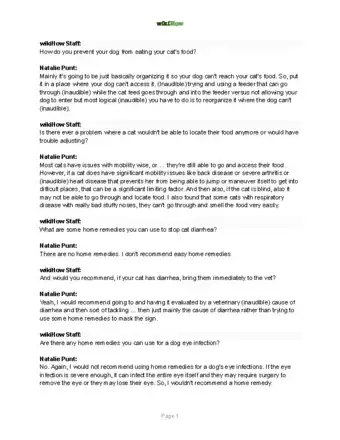
Thanks for reading our article! If you'd like to learn more about dogs' health, check out our in-depth interview with Natalie Punt, DVM.
References
- ↑ http://www.veterinarypartner.com/Content.plx?P=A&S=0&C=0&A=598
- ↑ http://www.vcahospitals.com/main/pet-health-information/article/animal-health/inflammatory-bowel-disease-in-cats/291
- ↑ Jergens A. Feline idiopathic inflammatory bowel disease: what we know and what remains to be unraveled. Journal Of Feline Medicine And Surgery [serial online]. July 2012;14(7):445-458.
- http://www.merckvetmanual.com/mvm/index.jsp Vet reference, somewhat technical.
About This Article
If your cat has only had diarrhea for a day or less, make sure it's drinking enough water, and check to see if the diarrhea may have been caused by any new changes in your cat's diet. However, if the diarrhea lasts for longer than a few days, your best bet is to go to the vet. If your veterinarian prescribes medication, wrap your cat in a towel like a cocoon and give the medication using a syringe at the side of the cat’s mouth. For more tips from our Veterinary reviewer, including when to add probiotics to your cat’s diet, keep reading!
